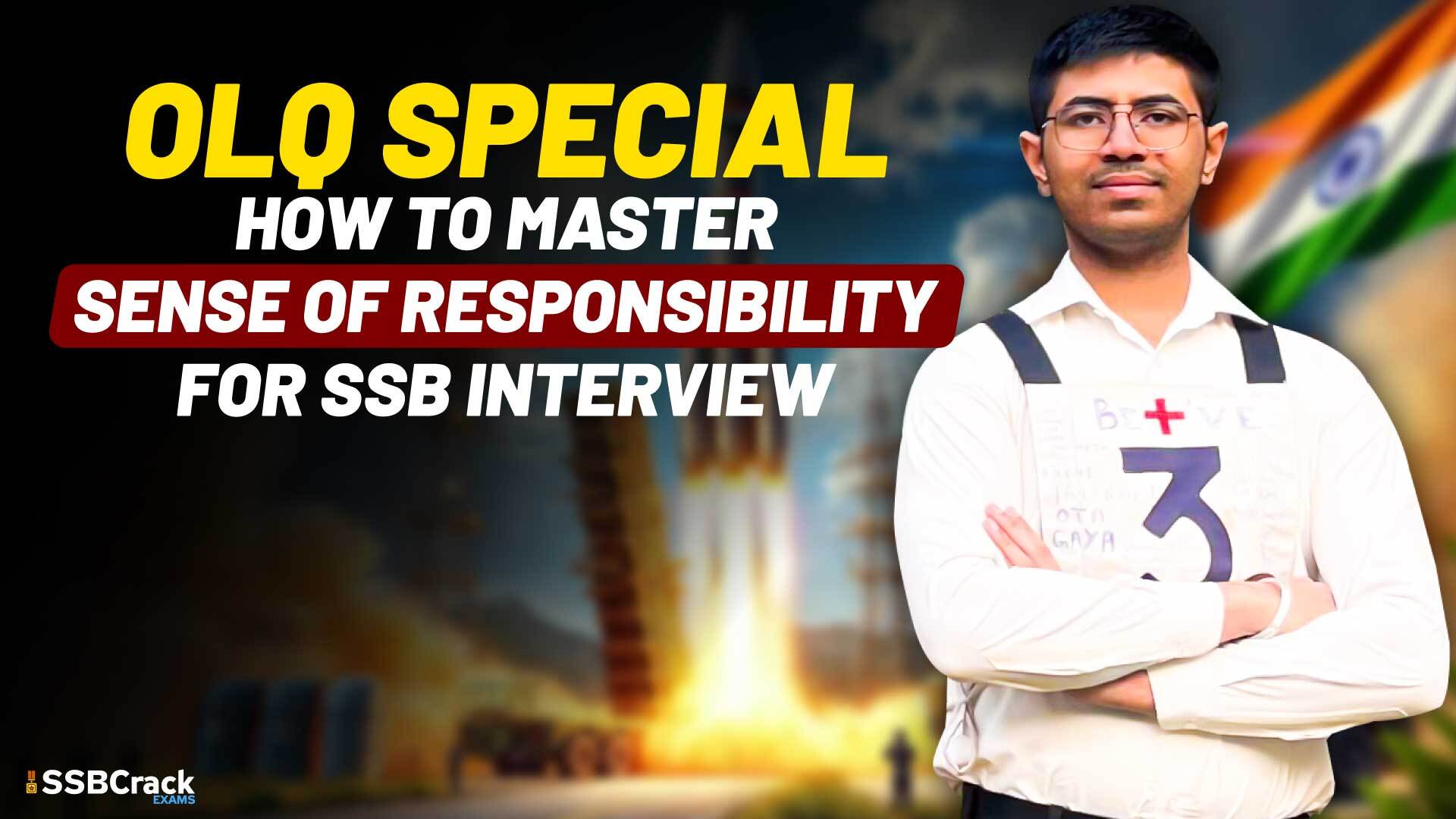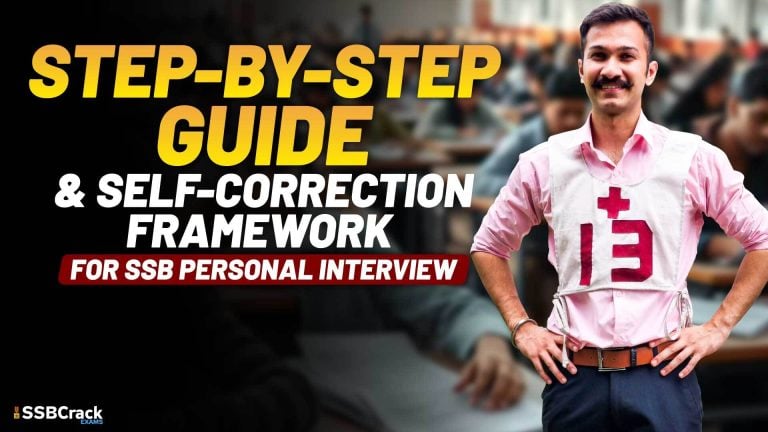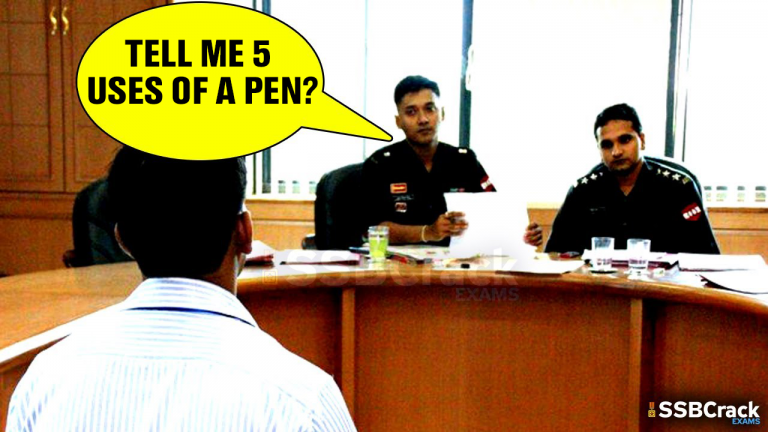Among the 15 Officer Like Qualities (OLQs) assessed in the SSB Interview, one that serves as the moral compass and backbone of leadership is the Sense of Responsibility. In the Armed Forces, lives, missions, and national interests depend on an officer’s ability to own up to duties, make ethical choices, and stay accountable—regardless of praise or pressure. This is why SSB assessors give this OLQ great weight across various tasks.
In this article, we’ll dive into:
- What Sense of Responsibility means
- Where and how it is assessed in SSB
- How to showcase it naturally in front of assessors
- What real-life tasks can help you develop this quality across different life settings
What is Sense of Responsibility?
Sense of Responsibility refers to:
“The ability to willingly accept duties, own one’s actions and decisions, fulfill commitments, and remain accountable to both individual and group obligations.”
A candidate with a high Sense of Responsibility:
- Takes initiative without waiting to be told
- Is dependable, even in small matters
- Admits mistakes instead of hiding them
- Thinks about consequences before acting
- Protects team interests and does not abandon responsibilities
In short, it’s about being reliable, mature, ethical, and duty-driven — the qualities central to every officer.
Where Is Sense of Responsibility Assessed in SSB?
1. Personal Interview (PI)
This is the most direct stage where this OLQ is assessed:
- Questions related to your duties at home, college, job, or with friends
- Your reactions to hypothetical dilemmas (e.g., helping a friend cheat, managing time for studies and duties)
- Consistency in your responses about academic performance, discipline, and accountability
2. Psychological Tests
- Thematic Apperception Test (TAT):
Does your protagonist take responsibility in crisis situations or pass the blame? - Situation Reaction Test (SRT):
Assesses whether you step up in emergencies, accept leadership, and take initiative. - Self-Description Test (SDT):
Shows whether others (parents, teachers, friends) perceive you as dependable and responsible.
3. GTO Tasks
- Group Planning Exercise (GPE):
Are you taking ownership of critical tasks and ensuring proper execution? - Command Task:
As the commander, do you confidently take charge and guide your subordinates responsibly? - PGT/HGT/FGT:
Shows whether you carry materials properly, look out for others’ safety, and fulfill your group role sincerely.
How Is Sense of Responsibility Evaluated?
Assessors look for:
- Voluntary assumption of duties
- Consistency in performance across tasks
- Maturity in decision-making
- Accountability in words and actions
- Courage to accept mistakes and correct them
They don’t expect perfection — they expect you to be reliable and honest in how you own your role, no matter how small or big it is.
How Can Aspirants Showcase Sense of Responsibility?
✔️ In GTO Tasks:
- Carry out assigned group roles sincerely without avoiding difficult parts
- Take initiative to distribute work or solve confusion in the group
- Ensure materials are safely managed (planks, ropes, load)
- Be mindful of safety and fairness during physical tasks
✔️ In Interview:
- Share examples of real-life duties you’ve handled — such as class monitor, hostel coordinator, sibling caretaker, club secretary, part-time job, or family responsibility
- Be honest about past mistakes and how you learned from them
✔️ In Psychology Tests:
- In TAT or SRT, let your protagonist take control, offer help, act ethically, and take charge of tasks
- In SDT, write what your teachers or friends say about your reliability, punctuality, and responsibility
How to Develop Sense of Responsibility in Daily Life
Here’s how you can build this quality in real-world settings:
At Home
- Take Initiative Without Being Asked
- Handle tasks like paying bills online, refilling gas, grocery shopping, or checking expiry dates in the fridge
- 🔹 Shows maturity and readiness
- Care for Family Members
- Help elders with digital tools or children with studies
- 🔹 Builds compassion and accountability
- Own Up to Mistakes
- Admit and correct errors in home chores or finances
- 🔹 Builds courage and ethical sense
At School/College/University
- Take Leadership in Academic or Club Projects
- Be the one who tracks deadlines, coordinates group effort, and ensures final delivery
- 🔹 Demonstrates responsibility under peer pressure
- Balance Studies and Extracurriculars
- Practice prioritization and self-discipline
- 🔹 Teaches self-governance and time management
- Volunteer for Social/Disciplinary Roles
- Assist faculty, help manage college events, serve as class representative
- 🔹 Reflects willingness to serve a group
At Workplace/Internship
- Deliver Tasks Without Excuses
- Meet deadlines, follow instructions, and accept accountability for errors
- 🔹 Shows professional maturity
- Go Beyond Job Description
- Volunteer for urgent work or help a struggling teammate
- 🔹 Demonstrates ownership mindset
- Follow Workplace Ethics
- Report concerns or mistakes honestly and respectfully
- 🔹 Develops courage and transparency
Final Thoughts
Sense of Responsibility is not loud — it’s a quiet force that reflects your maturity, ethics, dependability, and readiness to lead. In the SSB, it’s seen not just in your words but in the choices you make, the roles you embrace, and the way you carry yourself in a group.
An officer isn’t made by power — an officer is made by duty. Let that sense of responsibility guide you through every SSB task — and beyond.







